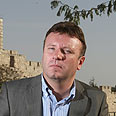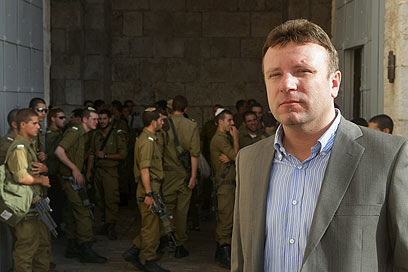
An unexpected Norwegian friend
In Norway he's considered the odd exception – a pro-Israel newspaper editor. Four years ago Vebjørn Selbekk published Prophet Muhammad cartoons, resulting in countless death threats. In recent visit to Jewish state he explains why it is so important to him to champion Israel
Four years ago, Norwegian journalist Vebjørn Selbekk received an e-mail with two photos of burnt bodies. "Take a good look at these pictures and imagine yourself in their place. You are criticizing the Prophet Muhammad and therefore your destiny will match that of the man in the picture," the e-mail noted.
"It was a shocking moment. I suddenly realized that my life had changed in an instant, that from a regular journalist I have turned into man whose life and family were being threatened," Selbekk remembers. "My wife immediately left the office and rushed home to be with our young son who was only nine at the time, and I rushed to call the police."
Selbekk became widely known in 2006 when as the editor of the newspaper Magazinet he decided to run cartoons of the Prophet Muhammad which had appeared in a Danish newspaper three months earlier and sparked a worldwide uproar.
"We wanted to show our readers what the fuss was about in Denmark, to give them the opportunity to decide for themselves whether the cartoons were offensive. To do this we had no choice but to run them ourselves," he says.
That decision proved to have serious consequences and Selbekk's life was soon being threatened on a regular basis. "After the 50th time I just stopped counting. I received thousands of harsh messages: 'We'll behead you' 'We'll come to your bedroom and wipe you out.'"
The family's panic led national police and the Norwegian intelligence agency to take the threats seriously. "Not only did they guard my house for nine months, they also talked to my kids and tried to prepare them for the new situation in their lives. They taught them how to identify suspicious envelopes and how you find out someone put a bomb under daddy's car. When things got worse we had to flee the house. We went into hiding for a week and changed various hotels. We even moved houses."
Selbekk visited Israel last week together with senior members of his newspaper's staff who came to get a more intimate look at Israel and the personal and political aspects they cover in their stories. We accompanied them in a tour of the Old City in Jerusalem as they observed the dozens of soldiers patrolling the area. Selbekk points to kaffiyahs being sold at the market stalls. "In Oslo Jews never dare to wear yarmulkes," he says, part sad and part angry, "but the radical Muslims don kaffiyahs to be recognized."

Selbekk in Jerusalem. 'Anti-Israel minority very influential' (Photo: Alex Kolomoisky)
Selbekk continues to warn against the growing power of radical Islam in Europe, particularly in Norway. "I'm not against Islam, but for freedom for all religions," he says. "But I do see the demographic change in Europe, particularly the change in Norway and we need to defend several important values on which democracy is based, such as freedom of the press, freedom of expression and religion."
Guilt trip
It is the journalist's 10th visit to Israel. Last year he came here with his wife and children and showed them the country whose image and right of existence he fights for in the Norwegian press. Selbekk's desire to champion Israel dates back to his first days as a reporter.
"My mother was born in East Germany and my grandfather was a soldier in the German army during World War II. They moved to Norway only later," he says. "I can't shake the thought of what was being done to Jews at that time. All Europeans have guilty feelings towards you. That's the main reason I decided I wanted to do something good for the Jewish people.
"As a child my parents would talk about the young new democratic state in the Middle East and followed was happening here with concern. Obviously my interest in Israel also grew being a religious person and as there's a connection between Judaism and the Christian faith."
How do Norwegians feel about Israel nowadays?
"Until the end of the 1960s there was a great amount of sympathy towards Israel, but Norwegians' image of Israel changed in the Six Day War. Suddenly it changed from a small country fighting for its existence and which must be protected at all costs, to a small country that succeeded in besting many enemies in six days. In time, the radical approach towards Israel also found its way into the political realm. Not to mention the fact that the Muslim minority in Norway, which is very anti-Israel, has an enormous effect on the national state of mind, which is seeping into the younger generation."
Selbekk adds that despite its image, modern day Norway is not anti-Semitic but anti-Israel and mainly pro-Palestinian. "I think that the majority of Norwegians are pro-Palestinian in respect to what is happening in Israel, certainly the political establishment and the media. But the riots and violence you see on the news only apply to a small group," he explains. "I am extremely worried about anti-Israel sentiments in Norway, but feel that the discourse on the growing power of Islam is beneficial for you.
"In my opinion, the Norwegians' fear of Islam is greater than their anger towards Israel. That is also the message I am trying to convey, that the anger and extremism we are experiencing happen on a daily basis in Israel. In fact, you're a democratic oasis in an area of dictatorships. Just like us, Israel as a nation and society is trying to succeed, only that your starting point is harder and we need to take that into account."
How do you explain the fact that Norway was very involved in peace efforts in the Middle East, such as the Oslo Accords, and now appears to be disconnected from such processes?
"Our partnership in the early 1990s, in the Oslo Accords, was unique and was made possible due to personal relations with Rabin and Arafat. But the partnership in the peace efforts went to our heads and created a sense that we, as Norwegians, know what's best for others. I don’t like this feeling we have now in Norway, that we're the world's conscience. Personally I also don't believe the Oslo Accords were good for Israel. Look what a mess and terror this created in Israel later on."
The low point
Radical responses to the cartoons were not only directed at Selbekk and his family but at the entire Norwegian people. Denmark and Norway's flags were burned in the Gaza Strip and the West Bank. Later the Norwegian and Danish embassies in Damascus were arsoned and the Norwegian embassy building in Tehran was raided by an angry mob.
"It was a huge shock to my people. They did not understand how anyone could burn Norway's national symbol, the country who made it its goal to make peace in the Middle East," he says. "Later when the embassies were burned, reactions towards me and my newspaper became disproportionate and the whole world started reporting on the chaos that was going on around us."
Even Norwegian Prime Minister Jens Stoltenberg publicly denounced Selbekk. "He told a major Norwegian newspaper that I should personally take responsibility for the burning of the embassy in Damascus. For me it was the low point in the whole affair, because he was pointing a finger at me. I felt abandoned. "
Have you spoken to him about what he said?
"Certainly. We met several time. He told me he didn't intend to turn me into the person responsible for what happened and that they didn’t handle the matter very well."
What are the limits of freedom of expression in your mind?
"Every society has different limits. Some are quite obvious. One cannot publish threats on people because of their race, religion or sexual orientation. But I believe that in a free society one can definitely criticize religions, discuss them and criticize the exploitations done in their names. The cartoons I published had a political message saying we must not accept the exploitation of religion to justify terror, to the gaining of political power or to the oppression of people."
Do you believe some things should not be published for fear of offending values which are sacred to others?
"That's the price we pay as a democratic society. I too am a religious person and when Christianity is being criticized I don't burn flags and throw stones. These values are important to Muslims too because they enable them to live by their religion. We even give them money to build mosques. I believe they should accept the Western world's set of values."
Despite having been pressured Selbekk says he never once considered apologizing for publishing the cartoons. "I just never felt the need because all I tried to do was maintain the freedom of the press. But a month after the cartoons were published, when things became more serious and we heard about violent clashes in Oslo and Copenhagen between young Muslims and neo-Nazis, we realized matters were getting out of control. We held a joint press conference with the Muslim leadership in Norway and politicians to calm matters. I said I was sorry if publishing the cartoons offended any religious feelings and that it was not our intent."
Leaving the Old City toward the Mamila Mall I ask Selbekk whether he has any plans to enter into politics.
"That's a dangerous questions," he laughs. "One must never mix work in the media and work in politics. If I become member of a political party it will end my career as a newspaper editor and that's not an easy decision. But the answer is yes, If the right opportunity presents itself, I would be happy to enter into politics."
- Follow Ynetnews on Facebook










